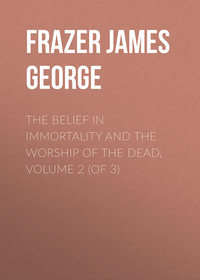 полная версия
полная версияThe Golden Bough: A Study in Magic and Religion (Third Edition, Vol. 03 of 12)
Attempts to rescue the lost soul from the spirits of the dead who are detaining it.
In Bolang Mongondo, a district in the west of Celebes, all sickness is ascribed to the ancestral spirits who have carried off the patient's soul. The object therefore is to bring back the soul of the sufferer and restore it to him. An eye-witness has thus described the attempted cure of a sick boy. The priestesses, who acted as physicians, made a doll of cloth and fastened it to the point of a spear, which an old woman held upright. Round this doll the priestesses danced, uttering charms, and chirruping as when one calls a dog. Then the old woman lowered the point of the spear a little, so that the priestesses could reach the doll. By this time the soul of the sick boy was supposed to be in the doll, having been brought into it by the incantations. So the priestesses approached it cautiously on tiptoe and caught the soul in the many-coloured cloths which they had been waving in the air. Then they laid the soul on the boy's head, that is, they wrapped his head in the cloth in which the soul was supposed to be, and stood still for some moments with great gravity, holding their hands on the patient's head. Suddenly there was a jerk, the priestesses whispered and shook their heads, and the cloth was taken off – the soul had escaped. The priestesses gave chase to it, running round and round the house, clucking and gesticulating as if they were driving hens into a poultry-yard. At last they recaptured the soul at the foot of the stair and restored it to its owner as before.181 Much in the same way an Australian medicine-man will sometimes bring the lost soul of a sick man into a puppet and restore it to the patient by pressing the puppet to his breast.182 In Uea, one of the Loyalty Islands, the souls of the dead seem to have been credited with the power of stealing the souls of the living. For when a man was sick the soul-doctor would go with a large troop of men and women to the graveyard. Here the men played on flutes and the women whistled softly to lure the soul home. After this had gone on for some time they formed in procession and moved homewards, the flutes playing and the women whistling all the way, while they led back the wandering soul and drove it gently along with open palms. On entering the patient's dwelling they commanded the soul in a loud voice to enter his body.183 In Madagascar when a man was sick or lunatic in consequence of the loss of his soul, his friends despatched a wizard in haste to fetch him a soul from the graveyard. The emissary repaired by night to the spot, and having made a hole in the wooden house which served as a tomb, begged the spirit of the patient's father to bestow a soul on his son or daughter, who had none. So saying he applied a bonnet to the hole, then folded it up and rushed back to the house of the sufferer, saying he had a soul for him. With that he clapped the bonnet on the head of the invalid, who at once said he felt much better and had recovered the soul which he had lost.184
Rescuing the soul from the dead in Borneo and Melanesia.
When a Dyak or Malay of some of the western tribes or districts of Borneo is taken ill, with vomiting and profuse sweating as the only symptoms, he thinks that one of his deceased kinsfolk or ancestors is at the bottom of it. To discover which of them is the culprit, a wise man or woman pulls a lock of hair on the crown of the sufferer's head, calling out the names of all his dead relations. The name at which the lock gives forth a sound is the name of the guilty party. If the patient's hair is too short to be tugged with effect, he knocks his forehead seven times against the forehead of a kinsman who has long hair. The hair of the latter is then tugged instead of that of the patient and answers to the test quite as well. When the blame has thus been satisfactorily laid at the door of the ghost who is responsible for the sickness, the physician, who, as in other countries, is often an old woman, remonstrates with him on his ill behaviour. “Go back,” says she, “to your grave; what do you come here for? The soul of the sick man does not choose to be called by you, and will remain yet a long time in its body.” Then she puts some ashes from the hearth in a winnowing fan and moulds out of them a small figure or image in human likeness. Seven times she moves the basket with the little ashen figure up and down before the patient, taking care not to obliterate the figure, while at the same time she says, “Sickness, settle in the head, belly, hands, etc.; then quickly pass into the corresponding part of the image,” whereupon the patient spits on the ashen image and pushes it from him with his left hand. Next the beldame lights a candle and goes to the grave of the person whose ghost is doing all the mischief. On the grave she throws the figure of ashes, calling out, “Ghost, plague the sick man no longer, and stay in your grave, that he may see you no more.” On her return she asks the anxious relations in the house, “Has his soul come back?” and they must answer quickly, “Yes, the soul of the sick man has come back.” Then she stands beside the patient, blows out the candle which had lighted the returning soul on its way, and strews yellow-coloured rice on the head of the convalescent, saying, “Cluck, soul! cluck, soul! cluck, soul!” Last of all she fastens on his right wrist a bracelet or ring which he must wear for three days.185 In this case we see that the saving of the soul is combined with a vicarious sacrifice to the ghost, who receives a puppet on which to work his will instead of on the poor soul. In San Cristoval, one of the Melanesian islands, the vicarious sacrifice takes the form of a pig or a fish. A malignant ghost of the name of Tapia is supposed to have seized on the sick man's soul and tied it up to a banyan-tree. Accordingly a man who has influence with Tapia takes a pig or fish to the holy place where the ghost resides and offers it to him, saying, “This is for you to eat in place of that man; eat this, don't kill him.” This satisfies the ghost; the soul is loosed from the tree and carried back to the sufferer, who naturally recovers.186 A regular part of the stock-in-trade of a Dyak medicine-man is a crystal into which he gazes to detect the hiding-place of a lost soul or to identify the demon who is causing the sickness.187 In one of the New Hebrides a ghost will sometimes impound the souls of trespassers within a magic fence in his garden, and will only consent to pull up the fence and let the souls out on receiving an unqualified apology and a satisfactory assurance that no personal disrespect was intended.188 In Motlav, another Melanesian island, it is enough to call out the sick man's name in the sacred place where he rashly intruded, and then, when the cry of the kingfisher or some other bird is heard, to shout “Come back” to the soul of the sick man and run back with it to the house.189
Buryat mode of recovering a lost soul from the nether world.
It is a comparatively easy matter to save a soul which is merely tied up to a tree or detained as a vagrant in a pound; but it is a far harder task to fetch it up from the nether world, if it once gets down there. When a Buryat shaman is called in to attend a patient, the first thing he does is to ascertain where exactly the soul of the invalid is; for it may have strayed, or been stolen, or be languishing in the prison of the gloomy Erlik, lord of the world below. If it is anywhere in the neighbourhood, the shaman soon catches and replaces it in the patient's body. If it is far away, he searches the wide world till he finds it, ransacking the deep woods, the lonely steppes, and the bottom of the sea, not to be thrown off the scent even though the cunning soul runs to the sheep-walks in the hope that its footprints will be lost among the tracks of the sheep. But when the whole world has been searched in vain for the errant soul, the shaman knows that there is nothing for it but to go down to hell and seek the lost one among the spirits in prison. At the stern call of duty he does not flinch, though he knows that the journey is toilsome, and that the travelling expenses, which are naturally defrayed by the patient, are very heavy. Sometimes the lord of the infernal regions will only agree to release the soul on condition of receiving another in its stead, and that one the soul of the sick man's dearest friend. If the patient consents to the substitution, the shaman turns himself into a hawk, pounces upon the soul of the friend as it soars from his slumbering body in the form of a lark, and hands over the fluttering, struggling thing to the grim warden of the dead, who thereupon sets the soul of the sick man at liberty. So the sick man recovers and his friend dies.190
American Indian modes of recovering a lost soul from the land of the dead.
When a shaman declares that the soul of a sick Thompson Indian has been carried off by the dead, the good physician, who is the shaman himself, puts on a conical mask and sets off in pursuit. He now acts as if on a journey, jumping rivers and such like obstacles, searching, talking, and sometimes engaging in a tussle for the possession of the soul. His first step is to repair to the old trail by which the souls of heathen Thompsons went to the spirit-land; for nowadays the souls of Christian Thompsons travel by a new road. If he fails to find the tracks of the lost soul there, he searches all the graveyards, one after the other, and almost always discovers it in one of them. Sometimes he succeeds in heading off the departing soul by taking a short cut to the other world. A shaman can only stay a short time there. So as soon as he lays hands on the soul he is after, he bolts with it. The other souls give chase, but he stamps with his foot, on which he wears a rattle made of deer's hoofs. At the rattle of the hoofs the ghosts retreat and he hurries on. A bolder shaman will sometimes ask the ghosts for the soul, and if they refuse to give it, he will wrest it from them. They attack him, but he clubs them and brings away the soul by force. When he comes back to the world, he takes off his mask and shews his club all bloody. Then the people know he had a desperate struggle. If he foresees that the harrowing of hell is likely to prove a tough job, he increases the number of wooden pins in his mask. The rescued soul is placed by him on the patient's head and so returned to his body.191 Among the Twana Indians of Washington State the descent of the medicine-men into the nether world to rescue lost souls is represented in pantomime before the eyes of the spectators, who include women and children as well as men. The surface of the ground is often broken to facilitate the descent of the rescue party. When the adventurous band is supposed to have reached the bottom, they journey along, cross at least one stream, and travel till they come to the abode of the spirits. These they surprise, and after a desperate struggle, sustained with great ardour and a prodigious noise, they succeed in rescuing the poor souls, and so, wrapping them up in cloth, they make the best of their way back to the upper world and restore the recovered souls to their owners, who have been seen to cry heartily for joy at receiving them back.192
Abduction of souls by demons in Annam, Cochin-China, and China.
Often the abduction of a man's soul is set down to demons. The Annamites believe that when a man meets a demon and speaks to him, the demon inhales the man's breath and soul.193 The souls of the Bahnars of eastern Cochin-China are apt to be carried off by evil spirits, and the modes of recovering them are various. If a man suffers from a colic, the sorcerer may say that in planting sugar-cane, maize or what-not, he has pierced the stomach of a certain god who lives like a mole in the ground, and that the injured deity has punished him by abstracting his soul and burying it under a plant. Hence the cure for the colic is to pull up the plant and water the hole with millet wine and the blood of a fowl, a goat, or a pig. Again, if a child falls ill in the forest or the fields, it is because some devil has made off with its soul. To retrieve this spiritual loss the sorcerer constructs an apparatus which comprises an egg-shell in an egg-holder, a little waxen image of the sick child, and a small bamboo full of millet wine. This apparatus he sets up at a cross-road, praying the devil to drink the wine and surrender the stolen soul by depositing it in the egg-shell. Then he returns to the house, and putting a little cotton to the child's head restores the soul to its owner. Sometimes the sorcerer lays a trap for the thievish demon, the bait consisting of the liver of a pig or a fowl and the blood-smeared handle of a little mattock. At nightfall he sets the trap at a cross-road and lies in wait hard by. While the devil is licking the blood and munching the liver, the artful sorcerer pounces out on him, and after a severe struggle wrests the soul from his clutches, returning to the village victorious, but breathless and bleeding from his terrific encounter with the enemy of souls.194 Fits and convulsions are generally set down by the Chinese to the agency of certain mischievous spirits who love to draw men's souls out of their bodies. At Amoy the spirits who serve babies and children in this way rejoice in the high-sounding titles of “celestial agencies bestriding galloping horses” and “literary graduates residing halfway up in the sky.” When an infant is writhing in convulsions, the frightened mother hastens to the roof of the house, and, waving about a bamboo pole to which one of the child's garments is attached, cries out several times, “My child So-and-so, come back, return home!” Meantime, another inmate of the house bangs away at a gong in the hope of attracting the attention of the strayed soul, which is supposed to recognise the familiar garment and to slip into it. The garment containing the soul is then placed on or beside the child, and if the child does not die recovery is sure to follow sooner or later.195 Similarly we saw that some Indians catch a man's lost soul in his boots and restore it to his body by putting his feet into them.196
Abduction of souls by demons in the East Indies.
If Galelareese mariners are sailing past certain rocks or come to a river where they never were before, they must wash their faces, for otherwise the spirits of the rocks or the river would snatch away their souls.197 When a Dyak is about to leave a forest through which he has been walking alone, he never forgets to ask the demons to give him back his soul, for it may be that some forest-devil has carried it off. For the abduction of a soul may take place without its owner being aware of his loss, and it may happen either while he is awake or asleep.198 The Papuans of Geelvink Bay in New Guinea are apt to think that the mists which sometimes hang about the tops of tall trees in their tropical forests envelop a spirit or god called Narbrooi, who draws away the breath or soul of those whom he loves, thus causing them to languish and die. Accordingly, when a man lies sick, a friend or relation will go to one of these mist-capped trees and endeavour to recover the lost soul. At the foot of the tree he makes a peculiar sound to attract the attention of the spirit, and lights a cigar. In its curling smoke his fancy discerns the fair and youthful form of Narbrooi himself, who, decked with flowers, appears and informs the anxious enquirer whether the soul of his sick friend is with him or not. If it is, the man asks, “Has he done any wrong?” “Oh no!” the spirit answers, “I love him, and therefore I have taken him to myself.” So the man lays down an offering at the foot of the tree, and goes home with the soul of the sufferer in a straw bag. Arrived at the house, he empties the bag with its precious contents over the sick man's head, rubs his arms and hands with ginger-root, which he had first chewed small, and then ties a bandage round one of the patient's wrists. If the bandage bursts, it is a sign that Narbrooi has repented of his bargain, and is drawing away the sufferer once more to himself.199
Abduction of souls by demons in the Moluccas.
In the Moluccas when a man is unwell it is thought that some devil has carried away his soul to the tree, mountain, or hill where he (the devil) resides. A sorcerer having pointed out the devil's abode, the friends of the patient carry thither cooked rice, fruit, fish, raw eggs, a hen, a chicken, a silken robe, gold, armlets, and so forth. Having set out the food in order they pray, saying: “We come to offer to you, O devil, this offering of food, clothes, gold, and so on; take it and release the soul of the patient for whom we pray. Let it return to his body, and he who now is sick shall be made whole.” Then they eat a little and let the hen loose as a ransom for the soul of the patient; also they put down the raw eggs; but the silken robe, the gold, and the armlets they take home with them. As soon as they are come to the house they place a flat bowl containing the offerings which have been brought back at the sick man's head, and say to him: “Now is your soul released, and you shall fare well and live to grey hairs on the earth.”200 A more modern account from the same region describes how the friend of the patient, after depositing his offerings on the spot where the missing soul is supposed to be, calls out thrice the name of the sick person, adding, “Come with me, come with me.” Then he returns, making a motion with a cloth as if he had caught the soul in it. He must not look to right or left or speak a word to any one he meets, but must go straight to the patient's house. At the door he stands, and calling out the sick person's name, asks whether he is returned. Being answered from within that he is returned, he enters and lays the cloth in which he has caught the soul on the patient's throat, saying, “Now you are returned to the house.” Sometimes a substitute is provided; a doll, dressed up in gay clothing and tinsel, is offered to the demon in exchange for the patient's soul, with these words, “Give us back the ugly one which you have taken away and receive this pretty one instead.”201
Abduction of souls by demons in Celebes and Siberia.
Among the Alfoors or Toradjas of Poso, in Central Celebes, a wooden puppet is offered to the demon as a substitute for the soul which he has abstracted, and the patient must touch the puppet in order to identify himself with it. The effigy is then hung on a bamboo pole, which is planted at the place of sacrifice outside of the house. Here too are deposited offerings of rice, an egg, a little wood (which is afterwards kindled), a sherd of a broken cooking-pot, and so forth. A long rattan extends from the place of sacrifice to the sufferer, who grasps one end of it firmly, for along it his lost soul will return when the devil has kindly released it. All being ready, the priestess informs the demon that he has come to the wrong place, and that there are no doubt much better quarters where he could reside. Then the father of the patient, standing beside the offerings, takes up his parable as follows: “O demon, we forgot to sacrifice to you. You have visited us with this sickness; will you now go away from us to some other place? We have made ready provisions for you on the journey. See, here is a cooking-pot, here are rice, fire, and a fowl. O demon, go away from us.” With that the priestess strews rice towards the bamboo-pole to lure back the wandering soul; and the fowl promised to the devil is thrown in the same direction, but is instantly jerked back again by a string which, in a spirit of intelligent economy, has been previously attached to its leg. The demon is now supposed to accept the puppet, which hangs from the pole, and to release the soul, which, sliding down the pole and along the rattan, returns to its proper owner. And lest the evil spirit should repent of the barter which has just been effected, all communication with him is broken off by cutting down the pole.202 Similarly the Mongols make up a horse of birch-bark and a doll, and invite the demon to take the doll instead of the patient and to ride away on the horse.203 A Yakut shaman, rigged out in his professional costume, with his drum in his hand, will boldly descend into the lower world and haggle with the demon who has carried off a sick man's soul. Not uncommonly the demon proves amenable to reason, and in consideration of the narrow circumstances of the patient's family will accept a more moderate ransom than he at first demanded. For instance, he may be brought to put up with the skin of an Arctic hare or Arctic fox instead of a foal or a steer. The bargain being struck, the shaman hurries back to the sufferer's bedside, from which to the merely carnal eye he has never stirred, and informs the anxious relatives of the success of his mission. They in turn gladly hasten to provide the ransom.204
Souls rescued from demons at a house-warming in Minahassa.
Demons are especially feared by persons who have just entered a new house. Hence at a house-warming among the Alfoors of Minahassa in Celebes the priest performs a ceremony for the purpose of restoring their souls to the inmates. He hangs up a bag at the place of sacrifice and then goes through a list of the gods. There are so many of them that this takes him the whole night through without stopping. In the morning he offers the gods an egg and some rice. By this time the souls of the household are supposed to be gathered in the bag. So the priest takes the bag, and holding it on the head of the master of the house, says, “Here you have your soul; go (soul) to-morrow away again.” He then does the same, saying the same words, to the housewife and all the other members of the family.205 Amongst the same Alfoors one way of recovering a sick man's soul is to let down a bowl by a belt out of a window and fish for the soul till it is caught in the bowl and hauled up.206 And among the same people, when a priest is bringing back a sick man's soul which he has caught in a cloth, he is preceded by a girl holding the large leaf of a certain palm over his head as an umbrella to keep him and the soul from getting wet, in case it should rain; and he is followed by a man brandishing a sword to deter other souls from any attempt at rescuing the captured spirit.207
Souls carried off by the sun and other gods.
In Nias, when a man dreams that a pig is fastened under a neighbour's house, it is a sign that some one in that house will die. They think that the sun-god is drawing away the shadows or souls of that household from this world of shadows to his own bright world of radiant light, and a ceremony must needs be performed to win back these passing souls to earth. Accordingly, while it is still night, the priest begins to drum and pray, and he continues his orisons till about nine o'clock next morning. Then he takes his stand at an opening in the roof through which he can behold the sun, and spreading out a cloth waits till the beams of the morning sun fall full upon it. In the sunbeams he thinks the wandering souls have come back again; so he wraps the cloth up tightly, and quitting the opening in the roof, hastens with his precious charge to the expectant household. Before each member of it he stops, and dipping his fingers into the cloth takes out his or her soul and restores it to the owner by touching the person on the forehead.208 The Thompson Indians of British Columbia think that the setting sun draws the souls of men away towards it; hence they will never sleep with their heads to the sunset.209 The Samoans tell how two young wizards, passing a house where a chief lay very sick, saw a company of gods from the mountain sitting in the doorway. They were handing from one to another the soul of the dying chief. It was wrapt in a leaf, and had been passed from the gods inside the house to those sitting in the doorway. One of the gods handed the soul to one of the wizards, taking him for a god in the dark, for it was night. Then all the gods rose up and went away; but the wizard kept the chief's soul. In the morning some women went with a present of fine mats to fetch a famous physician. The wizards were sitting on the shore as the women passed, and they said to the women, “Give us the mats and we will heal him.” So they went to the chief's house. He was very ill, his jaw hung down, and his end seemed near. But the wizards undid the leaf and let the soul into him again, and forthwith he brightened up and lived.210
Lost souls extracted from a fowl.
The Battas or Bataks of Sumatra believe that the soul of a living man may transmigrate into the body of an animal. Hence, for example, the doctor is sometimes desired to extract the patient's soul from the body of a fowl, in which it has been hidden away by an evil spirit.211








